BREAKING NEWS: Henry Montgomery, juvenile lifer in Montgomery v. Alabama 2016 US Supreme Court ruling that led to thousands of JLWOP re-sentencings, paroled after 57 yrs. He was convicted of killing a deputy sheriff.
FREE EFREN PAREDES, Jr. and remaining Michigan juvenile lifers now!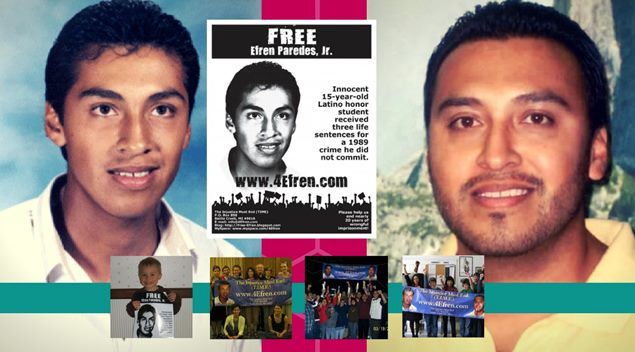
Efren Paredes was 15 when he was charged with the murder of a white store manager in Berrien County.
 Michigan Court of Appeals cited the passage above from Miller v. Alabama in overturning 2015 JLWOP sentence of Victor Garay of Kalamazoo County.
Michigan Court of Appeals cited the passage above from Miller v. Alabama in overturning 2015 JLWOP sentence of Victor Garay of Kalamazoo County.
To date, 94% of Michigan juvenile life sentences have been replaced with terms of years, after U.S. Supreme Court rulings outlawing JLWOP
Michigan appeals courts have overturned many of the remainder, most recently that of Victor Garay of Kalamazoo County
Paredes arrested at 15 in 1989 in majority-white St. Joseph for death of storeowner, has long maintained his innocence.
Berrien County courts, cops, have long targeted Benton Harbor’s Black and Latin youths; investigation of 1991 death of Eric McGinnis re-opened
by Necalli Ollin
 Story edited for length and clarity; original at http://fb.com/Free.Efren
Story edited for length and clarity; original at http://fb.com/Free.Efren
From the the campaign to Free Efren: “We are asking people who use Facebook to leave comments regarding the post that was recently made to the Free Efrén Facebook page titled “Judge Upholds Veritable Death Sentence for Efrén Paredes, Jr., Arrested for Crime at Age 15.” The link is available at http://fb.com/Free.Efren.
We are trying to garner a large number of comments opposing the judge’s ruling for the general public to read,
September 10, 2021

Berrien County Judge Charles LaSata, on bench since 2004
Today, Berrien County Circuit Court Judge Charles LaSata upheld a life without parole (LWOP) sentence for Efrén Paredes, Jr., a 48-year-old Latinx man, for a crime he was convicted of when he was 15.
Previous to the ruling, Michigan had been trending away from imposing or re-imposing juvenile LWOP sentences.
According to statewide data, 251 of the 367 juvenile lifer cases have been resolved as of September 9, 2021. Of that number, 94% have received term of year sentences and only 6% have received a LWOP sentence again. Statewide, juvenile lifers have received sentences averaging 30.5 years. Nationwide the average sentence has been 25 years, according to the Campaign for the Fair Sentencing of Youth.
Efrén was originally arrested at age 15 for the March 8, 1989 shooting death and robbery of a grocery store manager in St. Joseph, a majority-white town across the river from majority-Black Benton Harbor in southwestern Michigan. He was the first juvenile in Berrien County to be automatically transferred to Berrien County Circuit Court to be tried as an adult after passage of a 1988 Michigan law which authorized prosecutors to do so without a waiver hearing.
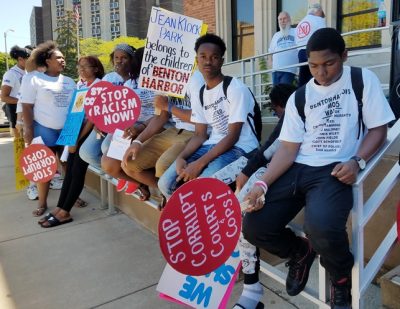
Benton Harbor youth at protest against racism by cops and courts May 26, 2018. VOD photo
Only three months after his arrest, Efrén was convicted by a jury composed of 11 white jurors and one African-American juror. He was subsequently sentenced to two LWOP sentences for one count of homicide and a parolable life sentence for one count of armed robbery.
Three other juveniles were also convicted in the case. Eric Mui, a 17-year-old Asian-American, received two 18-45 year sentences for one count of murder and armed robbery. Alex Mui, a 16-year-old Asian-American, received an 18-45 year sentence for one count of armed robbery. Jason Williamson, a 16-year-old white teen, received a six month sentence in a juvenile facility for one count of armed robbery.
All three received plea deals from the prosecutor’s office. Eric and Alex Mui were released from prison after serving 16 years in prison and Williamson served six months. Efrén was the only person charged in the case who went to trial.
U.S. SUPREME COURT INTERVENES

Kuntrell Jackson and Evan Miller, plaintiffs in USSC Miller v. Alabama/Jackson v. Arkansas, 14 when charged.
The U.S. Supreme Court issued a landmark decision in 2012, Miller v. Alabama, which banned mandatory LWOP sentences for juvenile offenders. In 2016, the high court made Miller retroactive, and applicable to juvenile offenders already serving the sentence. (Montgomery v. Louisiana.)
The U.S. Supreme Court also ordered that all juvenile offenders impacted by the ruling have their cases reviewed by a trial court judge from the respective county they were convicted in for resentencing consideration.
Berrien County Prosecutor Michael Sepic, now retired, prosecuted Paredes in 1989 and still claims his case was the most “memorable” of his career.

Former Pros. Michael Sepic
In 2016, Sepic filed a motion with the trial court seeking to reinstate a LWOP sentence in Efrén’s case, pursuant to Miller and . Sepic had originally prosecuted the case more than 32 years ago as an assistant prosecutor.
In 2020, Sepic retired as the county prosecutor. After his retirement, the newly elected county prosecutor, Steve Pierangeli, swore Sepic in as an assistant prosecutor so he could continue working on Efrén’s case. In a December 30, 2020 interview with the local newspaper, The Herald-Palladium, Sepic referred to Efrén’s case as the most memorable of his career.
On October 5-6, 2020, LaSata held a two-day hearing At the hearing, several witnesses testified on Efrén’s behalf, presenting an abundance of compelling anecdotal evidence of his growth, change, and rehabilitation. Other documentation was presented showing a wide range of programs he has successfully completed during his three decades of incarceration. Sepic was allowed to present evidence at the hearing as to why he felt a LWOP sentence was justified.
LaSata denies existence of racial injustice and mistreatment in St. Joseph
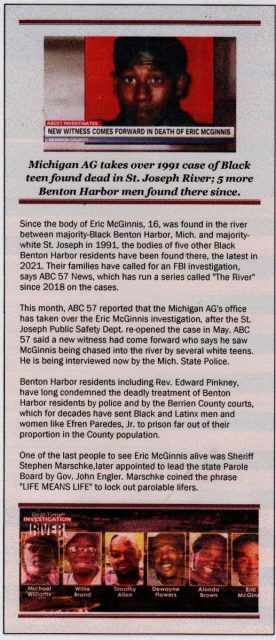 LaSata claimed in his ruling that racial injustice and the mistreatment of people of color has never existed in St. Joseph.
LaSata claimed in his ruling that racial injustice and the mistreatment of people of color has never existed in St. Joseph.
LaSata remarked he did not believe Efrén’s claim of ever being subjected to episodes of ethnic slurs, bullying, and shaming growing up as a brown boy in a majority white community. The year of Efrén’s arrest the city of St. Joseph was 94% white residents. Blacks made up 3% of the population and the Latinx population was a mere one percent.
Berrien County has seated white judges on the bench and white males have occupied the prosecutor’s office since its inception. This is true of other Michigan counties as well which has vastly contributed to the acute racial sentencing disparities.
“Children of color are 27% of the child population [in Michigan] and 71% of children serving LWOP sentences.” (Connie de la Vega & Michelle Leighton, “Sentencing Our Children to Die in Prison: Global Law and Practice,” 42 U.S.F. L. Rev. 983, 994 (2008)).
To many folks, LaSata’s ruling in Efrén’s case was a modern day legal lynching, one of many cases of the deaths and incarceration of Black and Latin residents of Benton Harbor.
(For further info on Benton Harbor cases above, go to The River (abc57.com)
The September 10th ruling reveals likely racial bias and disparate treatment in the cases of the two juvenile lifers on his docket, Paredes and Mark Abbatoy, who is white. Despite Sepic’s recommendations that both be re-sentenced to life without parole, LaSata re-sentenced Abbatoy to 40 to 60 years.

Mark Abbatoy
Efrén Paredes was convicted of shooting a white store manager four times and robbing the store where he and the victim were both employed. Four alibi witnesses have attested to Efrén’s whereabouts at the time the crime was committed which is corroborated by forensic evidence that disproves he committed the crime. In recent years new witnesses have also provided sworn affidavits that Mui and others convicted in the case admitted to lying about Efrén’s involvement in the crime to evade murder charges. Since his March 15, 1989 arrest Efrén has maintained his innocence and denied any involvement in the crime.
In Abbatoy’s case, he and another 17-year-old killed the co-defendant’s mother in 1997 so they could steal her car. According to a March 22, 2021 court hearing transcript in the Abbatoy case, LaSata described the tragic event by stating: “Defendant [Abbatoy] was incredibly brutal and depraved. The defendant beat [the victim] with a shovel for ten to fifteen minutes. The defendant struck the victim at least ten times with a shovel. … Three to four blows [were] so forceful that they fractured her skull embedding nine fragments of bone into her brain.”
To many folks, LaSata’s ruling in Efrén’s case was a modern day legal lynching.
State Appellate Court overturned trial court in JLWOP case of David Bennett
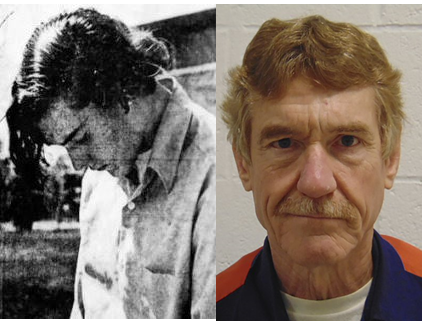
David Bennett at age 17 going into Garden City courtroom; and at 66 today.
Attorneys in Efrén’s case also cited a published Michigan Court of Appeals ruling made earlier this year named People v. Bennett, 2021 Mich. App. LEXIS 472. In 1972, David Bennett, age 17, was convicted of stabbing a woman in Wayne County dozens of times resulting in her death and sentenced to LWOP. Bennett was subsequently resentenced to LWOP on June 5, 2020 by a Wayne County trial court judge who reviewed the case to consider possible resentencing pursuant to the U.S. Supreme Court Miller v. Alabama ruling.
The Michigan Court of Appeals reversed the trial court ruling in the Bennett case on January 21, 2021. In doing so the appeals court stated that trial courts must decide “whether [a] defendant ‘was and would remain WHOLLY incapable of rehabilitation for THE REMAINDER OF HIS LIFE[.]'” (emphasis added) Failure to do so constitutes an abuse of discretion subject to reversal. (People v. Bennett, at *9) (quoting People v. Garay, 320 Mich. App. 29, 49 (2017)).
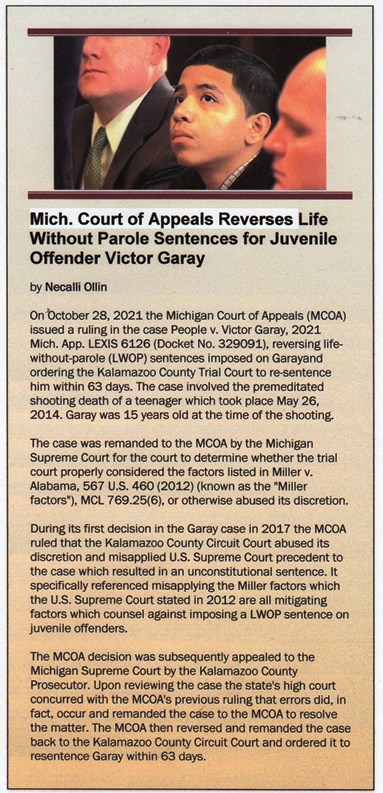 The Michigan COA added, “[t]o the extent that the resentencing court made a factual finding regarding Bennett’s risk of reoffending, it was clearly erroneous because no evidence supported it. Nor did any evidence support any other ground for Bennett’s continued incarceration.”
The Michigan COA added, “[t]o the extent that the resentencing court made a factual finding regarding Bennett’s risk of reoffending, it was clearly erroneous because no evidence supported it. Nor did any evidence support any other ground for Bennett’s continued incarceration.”
The state COA also said, “‘rehabilitation’ involves the successful completion of vocational, education, OR counseling programs designed to enable a prisoner to lead a useful life, free of crime, when released.” (emphasis added) (People v. Bennett, at *19).
Efrén’s legal team provided the court a robust body of anecdotal and documented evidence of his successful completion of each of these examples a multiplicity of times. They also provided results from psychological tests and actuarial risk assessment instruments that reflect Efrén poses a low risk of violence or recidivism if released.
Letters of support from three retired MDOC career professionals with decades of corrections experience (i.e., a former Warden, corrections officer, and Efrén’s employer of thirteen years) attesting to his capacity for change and rehabilitation, as well as letters from multiple professors from universities who taught classes Efrén participated in at various prisons, were provided to the court as well.

LaSata involved in wrongful conviction of Corey McCall

Corey McCall
The conviction of Corey Quentin McCall, was vacated on June 25, 2021 and he was released after spending 16 years behind bars for a crime he did not commit. LaSata was the district court judge responsible for a 2005 ruling that found there was sufficient evidence to bind the McCall case over to the circuit court to be tried for three counts of murder and one count of attempted murder.
While issuing his ruling on Paredes, LaSata cited decades-old prison rule infractions and alleged violations to justify his decision as well. Some included allegations of misconduct that was not substantiated by MDOC reports or that have been disproven. Included in LaSata’s list of infractions was that Efrén fathered a child nearly twelve years ago with a former staff member who was employed at a prison where he was being housed at the time. Efrén and his child’s mother subsequently became married and remain so today. According to LaSata, this human act between two consenting adults “violated all kinds of prison rules.” Efrén, however, never received a misconduct report for any rule violation related to the incident by MDOC staff.
LaSata begrudgingly acknowledged a number of Efrén’s accomplishments throughout his incarceration, as well as his large support system. But while he described Efrén as “intelligent, charismatic, and diligent,” he also characterized him as manipulative. He dismissed three decades of Efrén’s completion of rehabilitative programming, enriching the lives of others, participating in therapeutic counseling for the past eleven years, and numerous other achievements by theorizing it “may have” all been simply to receive “opportunities.”
31 states no longer sentence children to die in prison
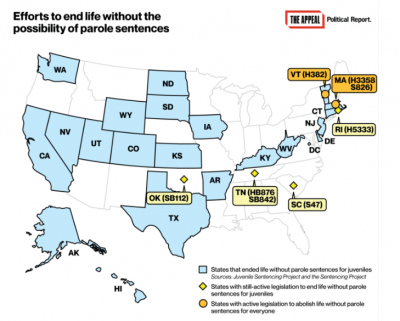 Since 2012, thirty-one states in the U.S. and the District of Columbia have abandoned the practice of sentencing children to die in prison or have no juvenile offenders serving a LWOP sentence according to the Campaign for the Fair Sentencing of Youth.
Since 2012, thirty-one states in the U.S. and the District of Columbia have abandoned the practice of sentencing children to die in prison or have no juvenile offenders serving a LWOP sentence according to the Campaign for the Fair Sentencing of Youth.
“[O]nly thirteen states have not substantially narrowed the application of LWOP to juveniles through statutory reform or by a lack of sentencing in practice.” (Elizabeth C. Kingston, “Validating Montgomery’s Recharacterization of Miller: An End to LWOP for Juveniles,” 38 U. La Verne L. Rev. 23, 51 (2016)). A growing consensus of states have embraced the U.S. Supreme Court’s view that LWOP sentences for juveniles are inhumane, draconian, and “akin to the death penalty.” (Miller v. Alabama, 132 S. Ct. 2455, 2466 (2012)).
After having spent more than two-thirds of his life behind bars Efrén deserves to receive a term of year sentence like the overwhelming majority — ninety-four percent — of other similarly situated juvenile lifers who have been resentenced across the state.
The Michigan Court of Appeals made it abundantly clear in the Bennett case that “‘[i]rreparable corruption,’ [i.e., forever having no capacity for change] is the ONLY ground [the U.S. Supreme Court] specifically identified for imposing a life-without-parole sentence [for a juvenile offender]. See Miller [v. Alabama], 567 U.S. at 479 (2012).” (emphasis added) (People v. Bennett, at *10).
RELATED:
************************************************************

 DONATE TO VOICE OF DETROIT
DONATE TO VOICE OF DETROIT
TO KEEP STORIES COMING ON OUR PRISON NATION AND POLICE STATE
Voice of Detroit newspaper, published pro bono, was founded in 2010 and has covered numerous issues related to the oppression of Black, Latin, and poor people across the U.S. and the world. Since last year, VOD has devoted its coverage exclusively to the epidemics of mass incarceration and killings and brutality by police in Michigan and the U.S. Our editors, writers and other staff are not paid. We live on very limited fixed incomes or are incarcerated.




